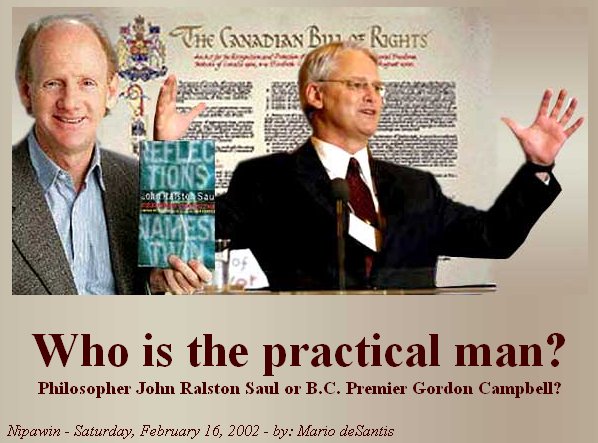Learning Stories
by
Mario deSantis
mariodesantis@hotmail.com
“I am a Canadian, free to speak without fear, free to worship in my own way, free to stand for what I think right, free to oppose what I believe wrong, and free to choose those who shall govern my country.” - -The Rt. Hon. John Diefenbaker, Canadian Bill of Rights, 1960
“The whole judicial system is at issue, it's worth more than one person.”--Serge Kujawa, Saskatchewan Crown Prosecutor, 1991
“The system is not more worth than one person's rights.”--Mario deSantis, 2002
Ensign Stories © Mario deSantis and Ensign
|
|
"Practical men, who believe themselves to be quite exempt from any intellectual influences, are usually the slaves of some defunct economist"-- John Maynard Keynes, British economist Rather than having people centered economic and social policies, we have governments dictating policies based on their ideological constructs. The world is not based on ideological constructs, the world is us, the world is people. However, it has become very difficult for people to express their public opinions as our democracies have been eroding and as our media has become the voice of business and their governments. Our governments, left or right or otherwise, have become all obsessed with the concept of reducing their roles in public affairs in accordance to the precepts of the Free Market, that is free trade supported by privatization and unrestricted competition. The economic relevancy of a sound public service sustaining democracy as opposed to the current drive for ever greater privatization sustaining the Free Market can be appreciated by referring to the thoughts of Canadian philosopher John Ralston Saul and by referring to the practical actions of B.C. Premier Gordon Campbell. John Ralston Saul says:
Practical actions of B.C. Premier Gordon Campbell:
And now the big question: Who is the practical man? John Ralston Saul or Gordon Campbell? References: Calculated politics: the pain of B.C. radicalism, by Jeffrey Simpson, February 15, 2002, The Globe and Mail |
